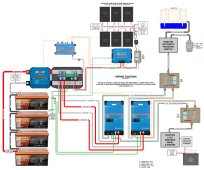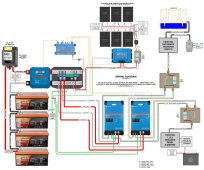livingthefreeway
New Member
I am in the process of creating plans for a large scale RV solar installation. It will be a 48V system, and with that comes some caveats of having the added difficulty of finding 48V nominal rated components. For example, at first I had planned on using simple Blue Sea Systems 6006 battery switches to act as a battery disconnect, only to find out from this forum that they are rated at a max voltage of 48V, meaning the would not be suitable for a 48V system that typically sees charging voltages of ~55V.
I was able to find one battery switch that is rated for up to 64V, however it is also quite expensive ($200 USD).
This leads me to my question, if my system is already accounting for emergency disconnect via fusing, (a Class T fuse as a SHTF fuse, and a ANN fuse inside the lynx shunt as a working fuse.), is the manual activated battery disconnect switch simply just a convenience for mateniance, and not a necessity? Or is there some other situation I'm not accounting for?
See my two attached solar wiring diagrams. One with a $200 battery disconnect switch, and one without.
Thanks for your replies
I was able to find one battery switch that is rated for up to 64V, however it is also quite expensive ($200 USD).
This leads me to my question, if my system is already accounting for emergency disconnect via fusing, (a Class T fuse as a SHTF fuse, and a ANN fuse inside the lynx shunt as a working fuse.), is the manual activated battery disconnect switch simply just a convenience for mateniance, and not a necessity? Or is there some other situation I'm not accounting for?
See my two attached solar wiring diagrams. One with a $200 battery disconnect switch, and one without.
Thanks for your replies





